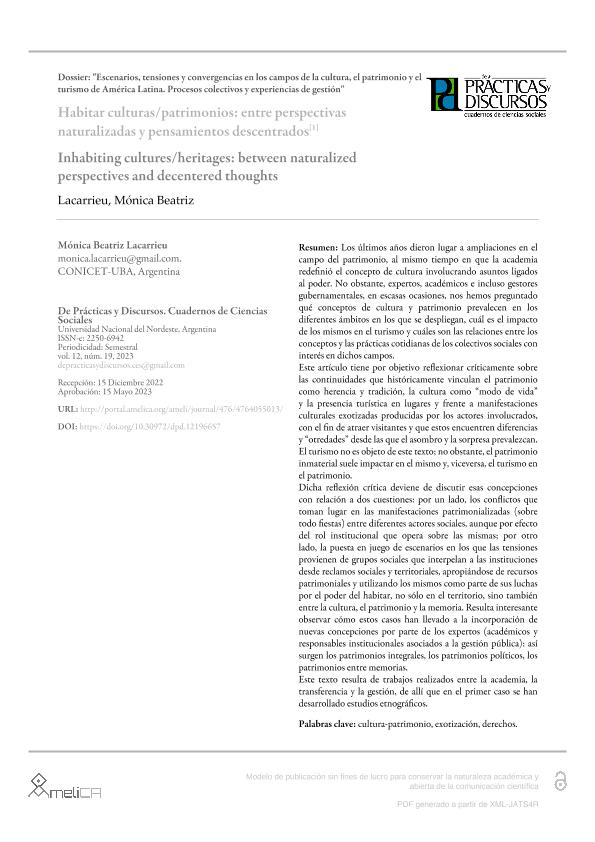Mostrar el registro sencillo del ítem
dc.contributor.author
Lacarrieu, Monica Beatriz

dc.date.available
2023-12-05T14:46:17Z
dc.date.issued
2023-05
dc.identifier.citation
Lacarrieu, Monica Beatriz; Habitar culturas/patrimonios: entre perspectivas naturalizadas y pensamientos descentrados; Universidad Nacional del Nordeste. Centro de Estudios Sociale; Revista de Prácticas y Discursos; 12; 19; 5-2023; 3-12
dc.identifier.uri
http://hdl.handle.net/11336/219330
dc.description.abstract
Los últimos años dieron lugar a ampliaciones en el campo del patrimonio, al mismo tiempo en que la academia redefinió el concepto de cultura involucrando asuntos ligados al poder. No obstante, expertos, académicos e incluso gestores gubernamentales, en escasas ocasiones, nos hemos preguntado qué conceptos de cultura y patrimonio prevalecen en los diferentes ámbitos en los que se despliegan, cuál es el impacto de los mismos en el turismo y cuáles son las relaciones entre los conceptos y las prácticas cotidianas de los colectivos sociales con interés en dichos campos. Este artículo tiene por objetivo reflexionar críticamente sobre las continuidades que históricamente vinculan el patrimonio como herencia y tradición, la cultura como “modo de vida” y la presencia turística en lugares y frente a manifestaciones culturales exotizadas producidas por los actores involucrados, con el fin de atraer visitantes y que estos encuentren diferencias y “otredades” desde las que el asombro y la sorpresa prevalezcan. El turismo no es objeto de este texto; no obstante, el patrimonio inmaterial suele impactar en el mismo y, viceversa, el turismo en el patrimonio.Dicha reflexión crítica deviene de discutir esas concepciones con relación a dos cuestiones: por un lado, los conflictos que toman lugar en las manifestaciones patrimonializadas (sobre todo fiestas) entre diferentes actores sociales, aunque por efecto del rol institucional que opera sobre las mismas; por otro lado, la puesta en juego de escenarios en los que las tensiones provienen de grupos sociales que interpelan a las instituciones desde reclamos sociales y territoriales, apropiándose de recursos patrimoniales y utilizando los mismos como parte de sus luchas por el poder del habitar, no sólo en el territorio, sino también entre la cultura, el patrimonio y la memoria. Resulta interesante observar cómo estos casos han llevado a la incorporación de nuevas concepciones por parte de los expertos (académicos y responsables institucionales asociados a la gestión pública): así surgen los patrimonios integrales, los patrimonios políticos, los patrimonios entre memorias. Este texto resulta de trabajos realizados entre la academia, la transferencia y la gestión, de allí que en el primer caso se han desarrollado estudios etnográficos.
dc.description.abstract
The last few years gave rise to expansions in the field of heritage, at the same time that the academy redefined the concept of culture involving issues linked to power. However, experts, academics and even government managers, on a few occasions we have asked ourselves what concepts of culture and heritage prevail in the different areas in which they are deployed, what is their impact on tourism and what are the relationships between the concepts and the daily practices of the social groups with an interest in these fields. is article aims to critically reflect on the continuities that historically link heritage as heritage and tradition, culture as a "way of life" and the tourist presence in places and in the face of exotic cultural manifestations produced by the actors involved in order to attract visitors and that they find differences and "otherness", from which amazement and surprise prevail. Tourism is not the subject of this text, however, intangible heritage usually has an impact on it and, vice versa, tourism on heritage.Said critical reflection comes from discussing these conceptions in relation to two issues: on the one hand, the conflicts that take place in the patrimonialized manifestations (especially parties) between different social actors, although due to the effect of the institutional role that operates on them. On the other hand, the putting into play of scenarios in which the tensions come from social groups that question the institutions from social and territorial claims, appropriating patrimonial resources and using them as part of their struggles for the power of living, does not only in the territory, but also between culture, heritage and memory. It is interesting to observe how these cases have led to the incorporation of new conceptions by the experts (academics and institutional managers associated with public management): as well: integral patrimonies, political patrimonies, patrimonies between memories emerge. This text is the result of work made between the academy, the transfer and the management, hence in the first case ethnographic studies have been developed.
dc.format
application/pdf
dc.language.iso
spa
dc.publisher
Universidad Nacional del Nordeste. Centro de Estudios Sociale
dc.rights
info:eu-repo/semantics/openAccess
dc.rights.uri
https://creativecommons.org/licenses/by-nc-sa/2.5/ar/
dc.subject
cultura
dc.subject
patrimonio
dc.subject
exotización
dc.subject
derechos
dc.subject.classification
Otras Humanidades

dc.subject.classification
Otras Humanidades

dc.subject.classification
HUMANIDADES

dc.title
Habitar culturas/patrimonios: entre perspectivas naturalizadas y pensamientos descentrados
dc.title
Inhabiting cultures/heritages: between naturalized perspectives and decentered thoughts
dc.type
info:eu-repo/semantics/article
dc.type
info:ar-repo/semantics/artículo
dc.type
info:eu-repo/semantics/publishedVersion
dc.date.updated
2023-12-04T12:54:14Z
dc.identifier.eissn
2250-6942
dc.journal.volume
12
dc.journal.number
19
dc.journal.pagination
3-12
dc.journal.pais
Argentina

dc.journal.ciudad
Resistencia
dc.description.fil
Fil: Lacarrieu, Monica Beatriz. Universidad de Buenos Aires. Facultad de Filosofía y Letras. Instituto de Ciencias Antropológicas. Sección de Antropología Social; Argentina. Consejo Nacional de Investigaciones Científicas y Técnicas; Argentina
dc.journal.title
Revista de Prácticas y Discursos
dc.relation.alternativeid
info:eu-repo/semantics/altIdentifier/url/https://revistas.unne.edu.ar/index.php/dpd/article/view/6657
Archivos asociados
